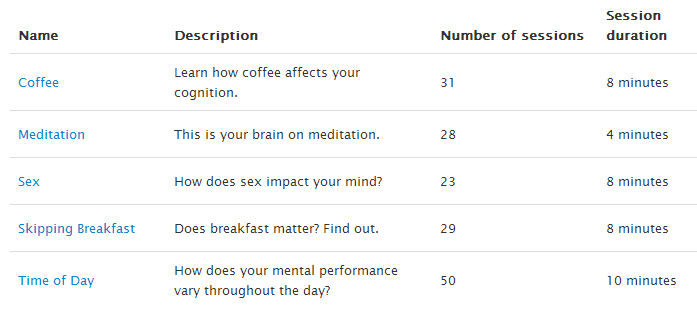10 Minutes of Exercise Speeds up Your Thinking
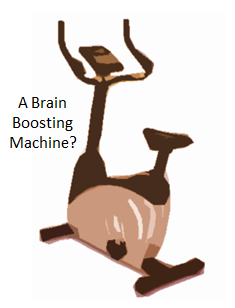 There is little doubt that physical exercise is a proven technique for both brain development and improving cognitive and emotional performance in real-time. There are many posts on the Next Brain blog that share the relevant research and techniques.
There is little doubt that physical exercise is a proven technique for both brain development and improving cognitive and emotional performance in real-time. There are many posts on the Next Brain blog that share the relevant research and techniques.
A recent post in the National Geographic, how 10 minutes of exercise gives your brain a boost, adds more weight to the point. Just minutes on a stationary bike produced an meaningful increase in the speed and accuracy of task-based thinking.
Fortunately, I have a stationary bike and have tested this technique many times. I will set my mind on a decision or problem and ruminate while riding. Useful insights are delivered about 30% of the time. Interested to hear from readers that may use this or a similar technique.
Categories: Other Tags:
Learn New Motors Skills Just By Watching Video
 See one, do one, teach one is the best path to learning a new skill or so the old saying goes. But how much do you actually learn just by watching especially as you get older? Quite a bit, at least according to recent research to be presented at an upcoming meeting of the American Academy of Neurology.
See one, do one, teach one is the best path to learning a new skill or so the old saying goes. But how much do you actually learn just by watching especially as you get older? Quite a bit, at least according to recent research to be presented at an upcoming meeting of the American Academy of Neurology.
The study is discussed in a Science Daily blog post, Can You Boost Your Brain Power By Watching a Video? The findings are dramatic. Watching a video of how to perform a motor skill, improved performance by 11 times compared to a control group that watch videos on a topic unrelated to the motor skill (landscape videos). The researchers conclude:
“Our study lends credence to the idea that even as an adult, your brain is able to better learn skills just by watching the activity take place.”
While they tested on simple motor skills such as manipulating coins and cutting with scissors we are left wondering if it would work on more complex skills such as martial arts or drawing.
Categories: Other Tags:
How to Avoid Short Circuiting Your Thinking
 We are capable of great feats of thinking but we can also short circuit (mess up) how we perceive, remember, learn and make decisions on a regular basis. We all have these thinking foibles and scientist described them in various ways from decision traps to cognitive bias and heuristics of reason. For a quick overview of some of the biggest ones, check out five common mistakes your brain makes every day.
We are capable of great feats of thinking but we can also short circuit (mess up) how we perceive, remember, learn and make decisions on a regular basis. We all have these thinking foibles and scientist described them in various ways from decision traps to cognitive bias and heuristics of reason. For a quick overview of some of the biggest ones, check out five common mistakes your brain makes every day.
The post covers memory, expectations, loss aversion, stereotyping and predicting odds in simple terms and provides examples. What it does not provide (and most sources don’t) is ways to overcome or avoid them. For example, we are told that we trust our memories more than we should. We assume we remember events and experiences accurately when if fact there is good evidence that shows we distort and recreate them regularly. But what can you do? If I am not to trust my memory, what practical steps can I take to avoid the biases and mistakes of a faulty memory?
I am interested to hear from readers that have developed techniques to deal with unreliable memories, overbearing expectations or any of the other common mistakes our brain makes everyday. Such techniques should be a great way to improve our cognitive performance on a regular basis. Just what we want to discuss on the Next Brain Blog.
Categories: Other Tags:
2013 Sharp Brains Virtual Summit
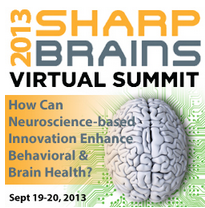 Sharp Brains organized an on-line summit focused on understanding how neuroscience-based innovation can enhance behavioral and brain health. The event included some 30 speakers covering industry and academia. The organizers summarized the top 30 highlights some of which are relevant for readers of the Next Brain Blog. For example:
Sharp Brains organized an on-line summit focused on understanding how neuroscience-based innovation can enhance behavioral and brain health. The event included some 30 speakers covering industry and academia. The organizers summarized the top 30 highlights some of which are relevant for readers of the Next Brain Blog. For example:
“The breakdown of how much time/effort is required to practice different types of meditation/relaxation exercises, and why Kirtan Kriya meditation may be more efficient and scalable than other forms of meditation as a public brain health measure for Alzheimer’s Disease prevention. (Dharma Singh Khalsa)”
You can access recordings to all the talks for $175. I am going to buy and review them later this month.
Categories: Other Tags:
15 Foot Brain That Glows According to Your EEG
A group of artists, brain imaging specialists, computer programmers, neuro-technologists and others are building a 15 foot model of the brain. It includes a network of colorful LED lights that are activated by signals sent from a portable EEG headset you wear while walking through the model.
The plan is to launch the project at the next Burning Man event. The team hopes (pending funding) to then take it to schools and inspire students and teachers.
Purpose Boosts Mental Performance & Brain Health
Studies at the Rush University Medical Center involving over 1000 subjects:
“…showed that people who reported greater purpose in life exhibited better cognition than those with less purpose in life even as plaques and tangles accumulated in their brains,” said Patricia A. Boyle, PhD.”
This is great news for anyone interested in improving cognitive performance or maintaining brain health as they age.
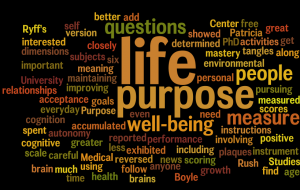 Purpose in life is determined by the meaning you get from everyday activities and how much of your time is spent pursuing goals that are important to you. It can be measured using Ryff’s well-being scale . The instrument measures well-being along six dimensions including autonomy, environmental mastery, personal growth, self acceptance, positive relationships with others and purpose in life. The questions that measure purpose in life are: 5,11,17,23,29,35 and 41. Be careful to follow the scoring instructions closely as the scores for some of the questions need to be reversed before you add them up.
Purpose in life is determined by the meaning you get from everyday activities and how much of your time is spent pursuing goals that are important to you. It can be measured using Ryff’s well-being scale . The instrument measures well-being along six dimensions including autonomy, environmental mastery, personal growth, self acceptance, positive relationships with others and purpose in life. The questions that measure purpose in life are: 5,11,17,23,29,35 and 41. Be careful to follow the scoring instructions closely as the scores for some of the questions need to be reversed before you add them up.
Categories: Cognitive Decline, Memory and Learning, Older Adult, Other, Problem Solving Tags:
Measure Your Cognitive Performance
A reader found Quantified Minds , a web site offering the opportunity to participate in a variety of simple experiments designed to measure your cognitive performance. Experiments that are running now are shown below.
You can even design your own experiments. I am going to try a couple. I’m hoping the platform is flexible enough to test some of the ideas we have discussed on the Next Brain Blog. If so, I might ask you participate in an experiment.
Categories: Other Tags:
National Brain Game Challenge Begins Today
For a $25 fee/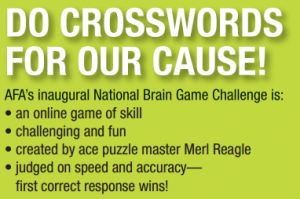 donation to the Alzheimer’s Foundation of America you can enter the National Brain Game Challenge. This is a chance to test your crossword puzzle solving abilities in an online game. There are two divisions (pro and public) with a $2500 first prize as well as other cash prizes in each division.
donation to the Alzheimer’s Foundation of America you can enter the National Brain Game Challenge. This is a chance to test your crossword puzzle solving abilities in an online game. There are two divisions (pro and public) with a $2500 first prize as well as other cash prizes in each division.
The foundation is sponsoring this contest to promote daily mental exercise as a way to help prevent the disease.
According to the website:
“Research suggests that regular mental activities might help reduce the risk of Alzheimer’s disease or other memory disorders by:
- enhancing cognitive reserve
- stimulating growth of new brain cells, and
- maintaining or strengthening connections between brain cells.”
I am interested to hear from readers that take the challenge or otherwise play crossword puzzles for fun and brain training.
Categories: Cognitive Decline, Other Tags:
Rosemary Scent Boosts Mental Speed & Accuracy
 I am often asked if aromas or scents improve brain function and enhance cognitive performance. Several previous posts on the Next Brain blog have highlighted peppermint, cinnamon, vanilla and citrus. Now, new research shows a link between aroma generated by rosemary oil and improved speed and accuracy in analytic and visual tasks. Rosemary contains an ingredient that impacts our neurochemistry. In the experiment the more of this ingredient that was absorbed the greater the chance of improved cognitive performance.
I am often asked if aromas or scents improve brain function and enhance cognitive performance. Several previous posts on the Next Brain blog have highlighted peppermint, cinnamon, vanilla and citrus. Now, new research shows a link between aroma generated by rosemary oil and improved speed and accuracy in analytic and visual tasks. Rosemary contains an ingredient that impacts our neurochemistry. In the experiment the more of this ingredient that was absorbed the greater the chance of improved cognitive performance.
For more information you can read the research article in the journal of Therapeutic Advances in Psychopharmacology or a another blog post.
Interested to hear from readers that use rosemary and other aromas to boost alertness, focus, processing speed, mood or other cognitive factors.
Categories: Ancient Ways, Mental Focus, Other, Problem Solving Tags:
Gift Giving Idea: Consider Fat Brain Toys
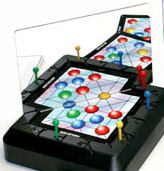 Fat Brain offers an amazing collection of high quality toys and entertainments designed to stimulate the brain and develop cognition. You can shop for toys by gender and ages ranging from 1 year old to 18 years old. From magnetic poetry and brain food (colorful goo) to the best selling stomp rockets and reflections (image shown), a truly unique game that combines mirrors, visual illusion and competition.
Fat Brain offers an amazing collection of high quality toys and entertainments designed to stimulate the brain and develop cognition. You can shop for toys by gender and ages ranging from 1 year old to 18 years old. From magnetic poetry and brain food (colorful goo) to the best selling stomp rockets and reflections (image shown), a truly unique game that combines mirrors, visual illusion and competition.
Just the kind of toys that should be on the holiday shopping list of Next Brain Blog readers. Interested to hear from anyone that has purchased or plays with Fat Brain Toys. How are they making you smarter?
Categories: Child, Cognitive Development, College Student, Mental Focus, Other, Perception, Problem Solving Tags: toys



